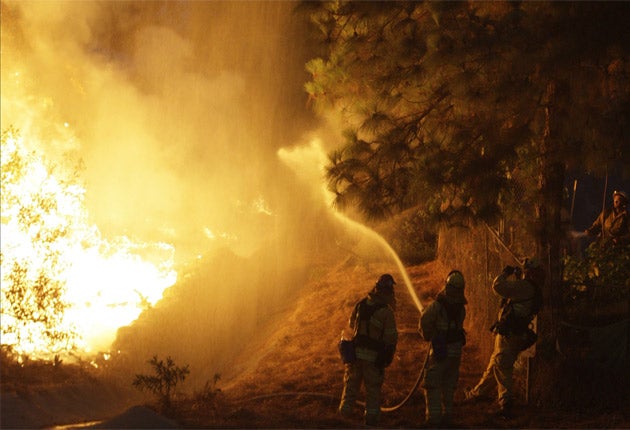Your support helps us to tell the story
From reproductive rights to climate change to Big Tech, The Independent is on the ground when the story is developing. Whether it's investigating the financials of Elon Musk's pro-Trump PAC or producing our latest documentary, 'The A Word', which shines a light on the American women fighting for reproductive rights, we know how important it is to parse out the facts from the messaging.
At such a critical moment in US history, we need reporters on the ground. Your donation allows us to keep sending journalists to speak to both sides of the story.
The Independent is trusted by Americans across the entire political spectrum. And unlike many other quality news outlets, we choose not to lock Americans out of our reporting and analysis with paywalls. We believe quality journalism should be available to everyone, paid for by those who can afford it.
Your support makes all the difference.A vast wildfire continued its advance on Los Angeles yesterday, destroying homes, depositing ash on the surface of swimming pools and car windscreens, and filling the sky above prominent landmarks like the Hollywood sign with apocalyptic clouds of white smoke.
More than 120,000 acres of the mountains which run across the city's northern border, just 15 miles from the centre of downtown LA, have gone up in smoke as firefighters struggle to cope with a heatwave that has seen temperatures soar above 43C (110 degrees Fahrenheit).
The blaze, which started last week and prompted a State of Emergency in four counties, has seen 12,000 people evacuated from their homes at the northern edge of heavily-populated suburbs like Glendale and Pasadena.
Fifty properties have already been destroyed by the fires and two firefighters were killed in a motor accident as they fled the flames.
Authorities issued angry warnings for locals to heed evacuation orders, citing the experience of one couple who decided to stay at home and sit out the fire in their garden hot-tub.
"They completely underestimated the fire's strength and were badly injured," said the local sheriff's office. "The hot-tub provided no protection whatsoever."
On the front line of the relief effort is the summit of Mount Wilson, in the tinder-dry Angeles National Forest, which is home to one of the most important astronomical observatories in America as well as to dozens of key radio, TV, and mobile telephone transmitting masts.
Twenty local TV stations would have their signals shut down and millions could be left without mobile telephone coverage if the site burned.
Firefighters have spent days in a battle to protect the area by removing trees and cutting vegetation-free safety zones around the area. They are said to be "fighting for every foot".
The spectacle of residents standing on rooftops, dousing their buildings with water, has become common across a vast swath of the region.
Rolling news television stations have spent days showing near-constant footage of aircraft dropping fire-retardant on to vulnerable zones.
At the Wildlife Waystation, an animal sanctuary in the shadow of the fire, volunteers evacuated 200 animals including ostriches, lions, tigers and black bears in a fleet of donated trucks. Several other wildlife parks have vehicles on standby to take animals to safety.
More than 3,600 emergency workers have not slept for days in an effort to bring the fire under control. The cost of the relief effort to the financially-challenged State of California is already approaching $15m (£9.3m).
Ominously, the fire comes at the start of what could be a troubling "wildfire season" for California, which is suffering from a long-running drought. September to November is traditionally the worst period for fires, thanks to strong Santa Ana winds that bring hot, dry air from the north-east.
Though wind levels were stronger yesterday than for much of the previous week, firefighters hoped that increased humidity levels would help them gain the upper hand.
"We are still at 5 per cent containment," said one fire commander, Mike Dietrich. "However with firefighting activity that occurred last night and the last several days, I expect that will increase substantially today."

Join our commenting forum
Join thought-provoking conversations, follow other Independent readers and see their replies
Comments